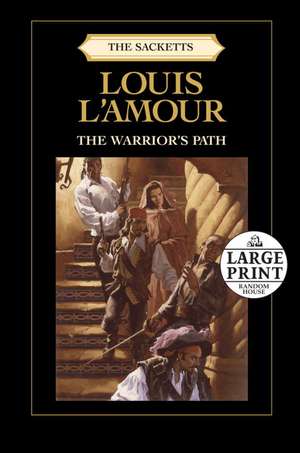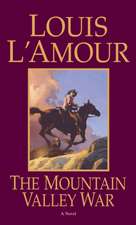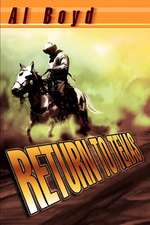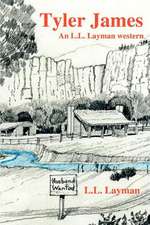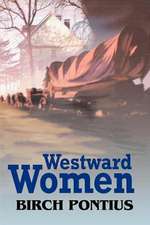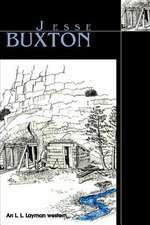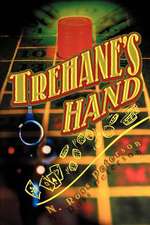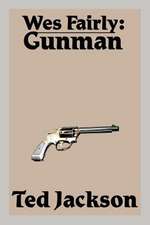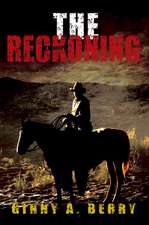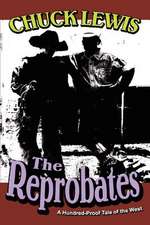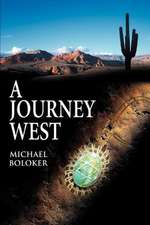The Warrior's Path: Sacketts (Unnumberd Pb)
Autor Louis L'Amouren Limba Engleză Paperback – 31 mar 2011
When Yance Sackett’s sister-in-law is kidnapped, he and Kin race north from Carolina to find her. They arrive at a superstitious town rife with rumors—and learn that someone very powerful was behind Diana’s disappearance. To bring the culprit to justice, one brother must sail to the exotic West Indies.
There, among pirates, cutthroats, and ruthless “businessmen,” he will apply the skills he learned as a frontiersman to an unfamiliar world—a world where one false move means instant death.
From the Paperback edition.
| Toate formatele și edițiile | Preț | Express |
|---|---|---|
| Paperback (2) | 48.43 lei 22-36 zile | +7.03 lei 5-11 zile |
| Bantam – 30 mai 1999 | 48.43 lei 22-36 zile | +7.03 lei 5-11 zile |
| Random House Large Print Publishing – 31 mar 2011 | 139.99 lei 22-36 zile |
Preț: 139.99 lei
Nou
Puncte Express: 210
Preț estimativ în valută:
26.79€ • 28.04$ • 22.16£
26.79€ • 28.04$ • 22.16£
Carte disponibilă
Livrare economică 17-31 martie
Preluare comenzi: 021 569.72.76
Specificații
ISBN-13: 9780739378076
ISBN-10: 0739378074
Pagini: 339
Dimensiuni: 155 x 233 x 24 mm
Greutate: 0.41 kg
Ediția:Text mare
Editura: Random House Large Print Publishing
Seria Sacketts (Unnumberd Pb)
ISBN-10: 0739378074
Pagini: 339
Dimensiuni: 155 x 233 x 24 mm
Greutate: 0.41 kg
Ediția:Text mare
Editura: Random House Large Print Publishing
Seria Sacketts (Unnumberd Pb)
Notă biografică
Our foremost storyteller of the authentic West, Louis L'Amour has thrilled a nation by chronicling the adventures of the brave men and women who settled the American frontier. There are more than 260 million copies of his books in print around the world.
From the Paperback edition.
From the Paperback edition.
Extras
Chapter One
What I hoped for was a fat bear, and what I came up with was a skinny Indian.
It was lonely on the mountain, and I had been watching the sun crest the peaks with light. There was some mist lying in the valleys, and all around me the rhododendrons were in bloom, covering the flanks of the Blue Ridge and the mountains nearby. Seated among them, their petals falling across my shoulders and into my hair, I watched the path below.
It was an old, old path, old before the coming of the Cherokees, old before the Shawnees hunted these hills, as old as the first men on these mountains.
All through the afternoon there had been no sound but the twittering of birds, but I knew something was coming up the trail yonder, for I'd seen birds fly up from time to time, marking its progress along the path, which was visible only at intervals.
What I wanted was a fat bear, for we were needful of grease, and my ribs were showing. When a body lives off the country around, fat is the hardest thing to come by. Fresh meat was no problem, but it was lean, mighty lean.
An Indian was the last thing I was wishful of seeing. We had good friends among them, but when a body becomes friendly with one nation, he naturally becomes an enemy of their enemies whether he is wishful for it or not. Moreover, a friendly Indian could eat us out of house and home, and we were shy of meat and corn flour.
Next to a fat bear it was Yance I was most anxious to see, for he was coming across the hills with fur, which we would soon be packing for trade in the settlements.
This Indian was old, and he was hurt. When I put my glass on him, I could see that. It was pa's glass, one used by him during his seafaring days and a right handy contrivance.
Sitting among the blooms of rhododendron, all pink, purple, and white, and scattered among them the pink of mountain laurel, I watched him come. Scrooched down in the brush the way I was, it was unlikely he'd see me.
The old man was reaching for the end of his rope. He was worn out and in need of help, but I'd had dealings with redskins since I was knee-high to a short duck, and Indians could be mighty sly. That old Indian might be a decoy to get me to show myself so's I could be bow shot or lanced, and I was wishful for neither.
He seemed to be in perishing bad shape. Coming to my feet, I must needs take the shortest way, which meant right down the steep cliff through the rhododendrons. It was all of three hundred paces back to where our path turned off, and that old man was hurting.
This here was our country, leaving out a few Indians who might argue the point, but I'd see no man die whom I had not personally shot.
He was still a-coming when I slid into the trail before him, but he was weaving a mighty weird path and was ready to drop in his tracks. I was close enough to catch him.
He wasn't only worn down from travel, he was gun shot.
Getting an arm around him to keep him from falling, I took time to slip his knife from its sheath for safety's sake. Then I walked him to where I could lead him through the brush to our cabin.
We'd built, Yance and I, well back in a niche among the rocks with a cliff overhanging from above. We had a fine field of fire on three sides in case of attack, which happened whenever a passing war party took the notion. This was the place we built after the Senecas killed pa and Tom Watkins in the mountains above Crab Orchard.
When I put that Indian down on the bed, he just naturally passed out. Putting water on to boil, I unlaced the top of his hunting shirt and found he'd been shot through the top of the shoulder with a musket ball. The ball was still there, pressed against the skin at the back of his shoulder. Taking my hunting knife, I slit the skin and oozed it out. The wound was several days old but wasn't in bad shape.
Sakim often commented on the fact that wounds in high country did not fester as often as they did in crowded cities. Sakim had come to America with pa, but he had been a physician and surgeon in central Asia, a descendant of a long line of scholars from the great age of medicine. Pa had met him after pa was kidnapped aboard Nick Bardle's ship where Sakim was also a sailor. He'd come aboard Bardle's pirate craft by shipwreck or capture, and when pa made his escape, Sakim was one of the two who chose to leave with him.
When we were youngsters at our small settlement on Shooting Creek, he had been our teacher. A noted scholar among his own people, his education far surpassed any available in Europe at the time. He taught us much of the sciences and of history but also of sickness and the treating of wounds, but for all his teaching, I was wishing him with us now.
The old man opened his eyes while I bathed his wound. "You are Sack-ett?"
"I am."
"I come Penney."
The only Penney I knew was Yance's wife, whose name had been Temperance Penney when he took her to be wed. She was back on Shooting Creek, waiting our return.
"Miz Penney say me come Sack-ett. Much trouble. Carrie gone."
Carrie? That would be Temp's baby sister, of whom I'd heard her speak.
"Gone? Gone where?"
"Pequots take him. Bad Indian. All much afraid of Pequot."
Right now I was beginning to regret this old Indian. Had it not been for him, I'd have been shagging it down the Cherokee Path to find ol' Yance, who was behind time in his coming. There was always the chance that he'd rounded up too many Indians.
Of course it took a few to be too many for Yance, and I had mercy for anybody who cornered him. I'd done it a couple of times when we were youngsters and was lucky to get away with my hair. Yance was bull strong, bear tough, and he could fight like a cornered catamount.
Yance was casual about most things, but pa had pressed it upon us to be prompt. It was a rule amongst us to be where we were supposed to be and no nonsense about it. We knew it was often the difference between life and death.
"Miz Penney say you come. Much bad Indian. Take two girls."
Taking up my musket, I moved to the door, standing where I could watch the path to our clearing. If Yance came running and was hard pressed, I might take down at least one of them. I mind the time he came to the door with a big she-bear about two jumps behind him. It was a nip-and-tuck thing getting him in the door and keeping the bear out, and just having freshly mopped the floor, I was almost minded to shut the door and let them fight it out.
"All we want is the hide and the tallow," I advised him later, "not the whole bear."
"Did you ever tote a fresh-killed bear or even a bear hide and its tallow over three ridges in a boiling hot sun? I figured to let him bring it right to the doorstep."
"What happened to your musket?"
He blushed. "I was fixin' for a shot when he came for me. I'd no choice but to allow for distance betwixt us, so I taken out running."
This time Yance would be a-horseback with pack horses, which would hold him to the trace and no chance to take to the woods. He was an almighty stubborn man and I knew he'd not leave his horses and furs for some Indian.
"You wife Penney?"
It took me a minute to realize he'd mistook me for Yance. What had he said before? Two girls gone? Taken by Indians?
He'd come a far piece if he'd come from Cape Ann or the nearby country, and those girls were long gone now. Still, I'd heard of a swap being made, goods for girls, or whatever. Anyway, she was kin by marriage to Yance. We'd never let them down. Whatever we could do would be done.
It must have taken that Indian a week to get here. Even more, it was likely. I'd never been up north, for it was Yance who'd gone girlin' up there to find himself a wife. Only I think he was just looking around when he saw her and took to her first sight.
Putting my musket close to hand, I put water on and began slicing meat into it for a stew. I added some wild onions and other herbs from the forest, for we did with whatever was to hand.
There was no question of not going. My corn crop would suffer from lack of cultivation and from varmints, but crops were a chancy thing in this country. There'd have to be grub got ready and packs. Whilst the stew was shaping up, I set to gathering what we'd need.
The old Warrior's Path would be the fastest route even though we might encounter war parties along the trail. Yet we must travel fast. Indians were notional about prisoners. They might want them for slaves, for torture, or for trade. They might want them simply to exhibit and then kill, but if they whined and carried on or got weak so they could not travel, the Indians would surely kill them out of hand. It had happened be-
fore.
Temperance Penney had been living in a settlement nigh to Cape Ann when Yance found her. We Sacketts were a free-roving folk, and now and again we boys would take off across the country to see what might be seen. Often one of us went alone, or sometimes two or three would venture together.
We had visited Jamestown a time or two, and Kane O'Hara from our settlement had gone down to the Spanish villages to the south. It was there he found his wife. We'd heard tell of the Pilgrim folk to the north, but Yance was the first to traipse off thataway.
Yance was curious as an Indian as to how other folks managed, and he lay up there in the woods watching their village until he had seen Temperance.
She was sixteen then, pert as a kitten and feisty, with the woman in her beginning to show. Already her good spirits had gotten her into trouble. Her neighbors were good folk but serious minded and with a set way about them and not much time for play or merrymaking.
Yance had only to look one time to know what he'd come north for, and come night, he'd taken a quarter of venison down, hung it outside her door, and rapped sharply on the door; then he skedaddled and laid low.
Now few of those northern settlers were hunters. In the England of their time all the game belonged to the king or ran on a few of the great estates, and unless they poached, they got none of it. Nor had they weapons about except during time of war. Fresh meat was hard to come by, and when they reached America where game abounded, they had no skill as hunters and were uneasy about taking game, for here, too, the game was said to belong to the king. A haunch of venison outside the door was a likely treat, so they took it in and were grateful.
If Temperance herself had any ideas, she wasn't talking about them, just going about her churning, weaving, and gathering as though she paid no mind to anything. After they were married, she told me she'd seen Yance on the slope and in the woods a time or two from a distance, so she had her own ideas where that venison came from.
A few nights later Yance came down from the trees bearing another haunch and was made welcome.
He was a bearer of news and from another colony as well, although, being one of us, I don't imagine he was too free about saying just where he came from. Yance was a good talker, that being the Welsh in him, for the Welsh are like the Irish in having a feel for the language and a liking for the sound of their own voices. He done a sight of tale telling, but he never once looked at Temperance, but she needed no telling to know whom he was talking to, and for.
Now a pert and feisty girl like Temp, with a shape like hers, had taken the eye of every man in the settlement, not to mention occasional peddlers and tinkers who passed. Some of the local sprouts had ideas about her, and then here comes this stranger in wide-brimmed hat and buckskins. They liked nothing about him.
Moreover, Yance had been brought up like all of us, free thinking and free speaking. Pa had believed in us using our minds, and he believed in freedom and in expressing ideas, nor was Yance one to keep his mouth shut. He stayed on, a-courting Temperance, and it wasn't long until he had crossed the ways of the folk, and he found himself in the stocks.
It was the way of the time to pitch rotten fruit or clods at whoever was in stocks, and as the boys and men cared little for Yance, and as he was a stranger in buckskins, like an Indian, he caught more than his share, good though he was at ducking. He had taken it, biding his time. He knew he would not be there forever; moreover, he had a good idea what Temp would do, and she did it.
Somehow or other she contrived to get the keys, unlock the stocks, and set Yance free. Being wise for his years, Yance just naturally left the country; being doubly wise, he had taken Temperance with him.
He might not have taken her, having respect for her family and all, but she wasn't to be left behind. Moreover, she had been doing some thinking beforehand and led him down the country where they could rout out a preaching man. He wasn't of a mind to read over them until she told him she'd go with Yance without it, and he got right to it.
From time to time after she came to us, she sent word home by traders or travelers, so they knew she was honestly wed and cared for. Now they were in trouble, and they'd sent for Yance.
This was 1630, and folks had been living in that Massachusetts Bay colony for ten years or so, but most of them were latecomers, innocent as babes about Indians and such.
Nobody needed to tell us about Pequots. We'd had no doings with them, but word is carried on the wind, and other Indians had told us of them. They were a strong, fierce people, unfriendly to the whites.
It was in my thoughts that it was Temp's mother who sent for Yance. She was a righteous, churchgoing woman, but she knew a man with hair on his chest when she saw him.
"Who took those girls?" I asked the old Indian again.
"Pequots."
Had he hesitated there just a mite? Or was that my imagination? If they were not already dead, trying to get prisoners away from the Pequots would be a hard-bought thing. Yance was suddenly in the yard, astride that big red horse he favored, his pack animals loaded down with fur. It took only a minute or two for me to lay it down to him.
"I'll go. No need for you to lose your crop."
From the Paperback edition.
What I hoped for was a fat bear, and what I came up with was a skinny Indian.
It was lonely on the mountain, and I had been watching the sun crest the peaks with light. There was some mist lying in the valleys, and all around me the rhododendrons were in bloom, covering the flanks of the Blue Ridge and the mountains nearby. Seated among them, their petals falling across my shoulders and into my hair, I watched the path below.
It was an old, old path, old before the coming of the Cherokees, old before the Shawnees hunted these hills, as old as the first men on these mountains.
All through the afternoon there had been no sound but the twittering of birds, but I knew something was coming up the trail yonder, for I'd seen birds fly up from time to time, marking its progress along the path, which was visible only at intervals.
What I wanted was a fat bear, for we were needful of grease, and my ribs were showing. When a body lives off the country around, fat is the hardest thing to come by. Fresh meat was no problem, but it was lean, mighty lean.
An Indian was the last thing I was wishful of seeing. We had good friends among them, but when a body becomes friendly with one nation, he naturally becomes an enemy of their enemies whether he is wishful for it or not. Moreover, a friendly Indian could eat us out of house and home, and we were shy of meat and corn flour.
Next to a fat bear it was Yance I was most anxious to see, for he was coming across the hills with fur, which we would soon be packing for trade in the settlements.
This Indian was old, and he was hurt. When I put my glass on him, I could see that. It was pa's glass, one used by him during his seafaring days and a right handy contrivance.
Sitting among the blooms of rhododendron, all pink, purple, and white, and scattered among them the pink of mountain laurel, I watched him come. Scrooched down in the brush the way I was, it was unlikely he'd see me.
The old man was reaching for the end of his rope. He was worn out and in need of help, but I'd had dealings with redskins since I was knee-high to a short duck, and Indians could be mighty sly. That old Indian might be a decoy to get me to show myself so's I could be bow shot or lanced, and I was wishful for neither.
He seemed to be in perishing bad shape. Coming to my feet, I must needs take the shortest way, which meant right down the steep cliff through the rhododendrons. It was all of three hundred paces back to where our path turned off, and that old man was hurting.
This here was our country, leaving out a few Indians who might argue the point, but I'd see no man die whom I had not personally shot.
He was still a-coming when I slid into the trail before him, but he was weaving a mighty weird path and was ready to drop in his tracks. I was close enough to catch him.
He wasn't only worn down from travel, he was gun shot.
Getting an arm around him to keep him from falling, I took time to slip his knife from its sheath for safety's sake. Then I walked him to where I could lead him through the brush to our cabin.
We'd built, Yance and I, well back in a niche among the rocks with a cliff overhanging from above. We had a fine field of fire on three sides in case of attack, which happened whenever a passing war party took the notion. This was the place we built after the Senecas killed pa and Tom Watkins in the mountains above Crab Orchard.
When I put that Indian down on the bed, he just naturally passed out. Putting water on to boil, I unlaced the top of his hunting shirt and found he'd been shot through the top of the shoulder with a musket ball. The ball was still there, pressed against the skin at the back of his shoulder. Taking my hunting knife, I slit the skin and oozed it out. The wound was several days old but wasn't in bad shape.
Sakim often commented on the fact that wounds in high country did not fester as often as they did in crowded cities. Sakim had come to America with pa, but he had been a physician and surgeon in central Asia, a descendant of a long line of scholars from the great age of medicine. Pa had met him after pa was kidnapped aboard Nick Bardle's ship where Sakim was also a sailor. He'd come aboard Bardle's pirate craft by shipwreck or capture, and when pa made his escape, Sakim was one of the two who chose to leave with him.
When we were youngsters at our small settlement on Shooting Creek, he had been our teacher. A noted scholar among his own people, his education far surpassed any available in Europe at the time. He taught us much of the sciences and of history but also of sickness and the treating of wounds, but for all his teaching, I was wishing him with us now.
The old man opened his eyes while I bathed his wound. "You are Sack-ett?"
"I am."
"I come Penney."
The only Penney I knew was Yance's wife, whose name had been Temperance Penney when he took her to be wed. She was back on Shooting Creek, waiting our return.
"Miz Penney say me come Sack-ett. Much trouble. Carrie gone."
Carrie? That would be Temp's baby sister, of whom I'd heard her speak.
"Gone? Gone where?"
"Pequots take him. Bad Indian. All much afraid of Pequot."
Right now I was beginning to regret this old Indian. Had it not been for him, I'd have been shagging it down the Cherokee Path to find ol' Yance, who was behind time in his coming. There was always the chance that he'd rounded up too many Indians.
Of course it took a few to be too many for Yance, and I had mercy for anybody who cornered him. I'd done it a couple of times when we were youngsters and was lucky to get away with my hair. Yance was bull strong, bear tough, and he could fight like a cornered catamount.
Yance was casual about most things, but pa had pressed it upon us to be prompt. It was a rule amongst us to be where we were supposed to be and no nonsense about it. We knew it was often the difference between life and death.
"Miz Penney say you come. Much bad Indian. Take two girls."
Taking up my musket, I moved to the door, standing where I could watch the path to our clearing. If Yance came running and was hard pressed, I might take down at least one of them. I mind the time he came to the door with a big she-bear about two jumps behind him. It was a nip-and-tuck thing getting him in the door and keeping the bear out, and just having freshly mopped the floor, I was almost minded to shut the door and let them fight it out.
"All we want is the hide and the tallow," I advised him later, "not the whole bear."
"Did you ever tote a fresh-killed bear or even a bear hide and its tallow over three ridges in a boiling hot sun? I figured to let him bring it right to the doorstep."
"What happened to your musket?"
He blushed. "I was fixin' for a shot when he came for me. I'd no choice but to allow for distance betwixt us, so I taken out running."
This time Yance would be a-horseback with pack horses, which would hold him to the trace and no chance to take to the woods. He was an almighty stubborn man and I knew he'd not leave his horses and furs for some Indian.
"You wife Penney?"
It took me a minute to realize he'd mistook me for Yance. What had he said before? Two girls gone? Taken by Indians?
He'd come a far piece if he'd come from Cape Ann or the nearby country, and those girls were long gone now. Still, I'd heard of a swap being made, goods for girls, or whatever. Anyway, she was kin by marriage to Yance. We'd never let them down. Whatever we could do would be done.
It must have taken that Indian a week to get here. Even more, it was likely. I'd never been up north, for it was Yance who'd gone girlin' up there to find himself a wife. Only I think he was just looking around when he saw her and took to her first sight.
Putting my musket close to hand, I put water on and began slicing meat into it for a stew. I added some wild onions and other herbs from the forest, for we did with whatever was to hand.
There was no question of not going. My corn crop would suffer from lack of cultivation and from varmints, but crops were a chancy thing in this country. There'd have to be grub got ready and packs. Whilst the stew was shaping up, I set to gathering what we'd need.
The old Warrior's Path would be the fastest route even though we might encounter war parties along the trail. Yet we must travel fast. Indians were notional about prisoners. They might want them for slaves, for torture, or for trade. They might want them simply to exhibit and then kill, but if they whined and carried on or got weak so they could not travel, the Indians would surely kill them out of hand. It had happened be-
fore.
Temperance Penney had been living in a settlement nigh to Cape Ann when Yance found her. We Sacketts were a free-roving folk, and now and again we boys would take off across the country to see what might be seen. Often one of us went alone, or sometimes two or three would venture together.
We had visited Jamestown a time or two, and Kane O'Hara from our settlement had gone down to the Spanish villages to the south. It was there he found his wife. We'd heard tell of the Pilgrim folk to the north, but Yance was the first to traipse off thataway.
Yance was curious as an Indian as to how other folks managed, and he lay up there in the woods watching their village until he had seen Temperance.
She was sixteen then, pert as a kitten and feisty, with the woman in her beginning to show. Already her good spirits had gotten her into trouble. Her neighbors were good folk but serious minded and with a set way about them and not much time for play or merrymaking.
Yance had only to look one time to know what he'd come north for, and come night, he'd taken a quarter of venison down, hung it outside her door, and rapped sharply on the door; then he skedaddled and laid low.
Now few of those northern settlers were hunters. In the England of their time all the game belonged to the king or ran on a few of the great estates, and unless they poached, they got none of it. Nor had they weapons about except during time of war. Fresh meat was hard to come by, and when they reached America where game abounded, they had no skill as hunters and were uneasy about taking game, for here, too, the game was said to belong to the king. A haunch of venison outside the door was a likely treat, so they took it in and were grateful.
If Temperance herself had any ideas, she wasn't talking about them, just going about her churning, weaving, and gathering as though she paid no mind to anything. After they were married, she told me she'd seen Yance on the slope and in the woods a time or two from a distance, so she had her own ideas where that venison came from.
A few nights later Yance came down from the trees bearing another haunch and was made welcome.
He was a bearer of news and from another colony as well, although, being one of us, I don't imagine he was too free about saying just where he came from. Yance was a good talker, that being the Welsh in him, for the Welsh are like the Irish in having a feel for the language and a liking for the sound of their own voices. He done a sight of tale telling, but he never once looked at Temperance, but she needed no telling to know whom he was talking to, and for.
Now a pert and feisty girl like Temp, with a shape like hers, had taken the eye of every man in the settlement, not to mention occasional peddlers and tinkers who passed. Some of the local sprouts had ideas about her, and then here comes this stranger in wide-brimmed hat and buckskins. They liked nothing about him.
Moreover, Yance had been brought up like all of us, free thinking and free speaking. Pa had believed in us using our minds, and he believed in freedom and in expressing ideas, nor was Yance one to keep his mouth shut. He stayed on, a-courting Temperance, and it wasn't long until he had crossed the ways of the folk, and he found himself in the stocks.
It was the way of the time to pitch rotten fruit or clods at whoever was in stocks, and as the boys and men cared little for Yance, and as he was a stranger in buckskins, like an Indian, he caught more than his share, good though he was at ducking. He had taken it, biding his time. He knew he would not be there forever; moreover, he had a good idea what Temp would do, and she did it.
Somehow or other she contrived to get the keys, unlock the stocks, and set Yance free. Being wise for his years, Yance just naturally left the country; being doubly wise, he had taken Temperance with him.
He might not have taken her, having respect for her family and all, but she wasn't to be left behind. Moreover, she had been doing some thinking beforehand and led him down the country where they could rout out a preaching man. He wasn't of a mind to read over them until she told him she'd go with Yance without it, and he got right to it.
From time to time after she came to us, she sent word home by traders or travelers, so they knew she was honestly wed and cared for. Now they were in trouble, and they'd sent for Yance.
This was 1630, and folks had been living in that Massachusetts Bay colony for ten years or so, but most of them were latecomers, innocent as babes about Indians and such.
Nobody needed to tell us about Pequots. We'd had no doings with them, but word is carried on the wind, and other Indians had told us of them. They were a strong, fierce people, unfriendly to the whites.
It was in my thoughts that it was Temp's mother who sent for Yance. She was a righteous, churchgoing woman, but she knew a man with hair on his chest when she saw him.
"Who took those girls?" I asked the old Indian again.
"Pequots."
Had he hesitated there just a mite? Or was that my imagination? If they were not already dead, trying to get prisoners away from the Pequots would be a hard-bought thing. Yance was suddenly in the yard, astride that big red horse he favored, his pack animals loaded down with fur. It took only a minute or two for me to lay it down to him.
"I'll go. No need for you to lose your crop."
From the Paperback edition.
